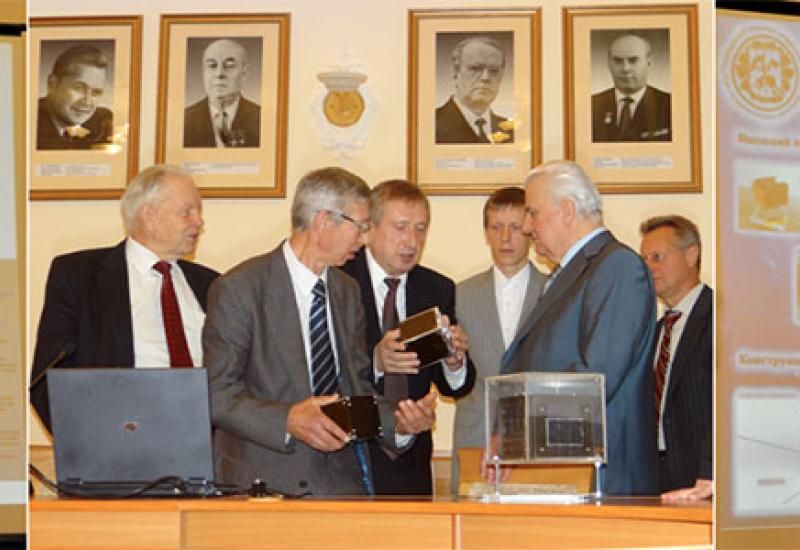On November, 7 at NTUU "KPI" was held a working meeting of representatives of Ukrainian universities who are involved in the development of national programmes of student micro- and nanosatellites with the first President of Ukraine Leonid Kravchuk.
The meeting was attended by the rector of the National Technical University of Ukraine “Kiev Polytechnic Institute” Michael Zgurovsky, rector of the National Aerospace University named after Zhukovsky “Kharkiv Aviation Institute” Vladimir Krivtsov, Advisor to the Chairman of the State Space Agency of Ukraine Eduard Kuznetsov, Advisor to the Chairman of the Verkhovna Rada of Ukraine Mykola Petrenko , head of the national Space agency of Ukraine Yaroslav Stefanishin , Pro-rector for Research of NTUU “KPI” Michael Ilchenko, representatives of the Dnipropetrovsk National University named after Oles Gonchar and faculties of NTUU “KPI” who are engaged in space inquiry.
“Recently in space activities a new very important issue has emerged – a launch into orbit of so-called youth satellites that provide research programmes of students . Such programmes are implemented, for example, for earth sounding from space, researching ecological problems, climate change, improving space communications - said at the beginning of conversation Rector of “KPI” Michael Zgurovsky. - It is believed that countries that carry out youth satellites think not only about achieving certain current goals, but also about their future and acquirements of new generations of engineers and scientists. There are a lot of examples of such countries. Here in Ukraine universities also work in this concept and we were ready to launch such a satellite a few years ago”.
But efforts of the universities only are not enough: the decision for the admission to the next carrier launches and youth satellite is rendered at the state authority. It is clear that a project has not only sci-tech, but also political significance. That is why appropriate governmental resolution and relevant support of government institution are needed. In order to get such kind of support representatives of “KPI” and its partners in the implementation of space projects appealed to Leonid Kravchuk .
The chancellor of the National Aerospace University named after Zhukovsky “Kharkiv Aviation Institute”, Vladimir Krivcov, the dean of the physicotechnical faculty of the Dnepropetrovsk National University named for Oles Gomchar, Aleksandr Petrenko and the professor of the faculty of Aircraft and Space Systems of the NTUU ”KPI” Lev Ryzhkov told the participants of this meeting about the contribution of the universities to the execution of “National Grant Scientific and Technical Programme” and development of youth satelites, and also about political aspects of this activity.
Today in Ukraine not only youth microsatellites are developed, but also nanosatelites, that differs from the first for the mass, payload and tasks they have to complete on Orbit. However the level of some implemented technical solutions in it is higher than in the foreign analogues. The senior research assistant of the Faculty of Heat Power Engineering of the NTUU”KPI”, Boris Rassamakin informed guests about such kind of nanosatelite created by department workers and students of 5 Faculties. This satellite (besides, its life-size mockup was demonstrated to the attendees) is destined for investigating physical state and tome history of atmosphere stratosphere and Earth’s ozon layer, i.e. for researching the phenomena, that influence on the Earth climate, and for completing other tasks, particularly related to the communications, connections and so on. Technically, it is ready for the space flight, but organizational policies of its launching were not decided in Ukraine. That’s why in KPI it was decided to arrange such launching in the cooperation with foreign universities. The main partners in this project were the Delftware Technical University ( The Netherlands) and Shenyang Aerospace University (China), and in March of the next year it will be launched to Orbit in one container with other nanosatelites, created in European universities.
At the end of conversation Leonid Kravchuk promised to accede to deciding organizational policies of preparing launching youth micro- and nanosatelites, and also informing the senior government officers about developments in national science in this field and about their importance for Ukraine.

